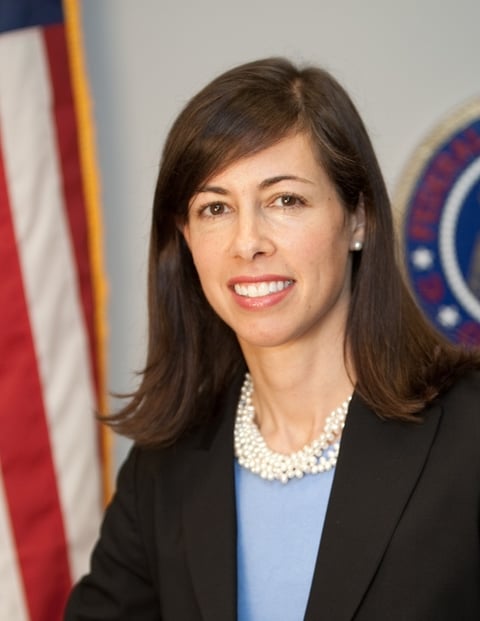FCC Commissioner Jessica Rosenworcel is not buying the argument that the U.S. can’t hold another major spectrum auction until a financial banking issue gets settled, as FCC Chairman Ajit Pai has indicated.
Pai previously has explained that the Communications Act requires that upfront payments made by bidders in spectrum auctions be deposited in “an interest bearing account at a financial institution designated … by the Commission (after consultation with the Secretary of the Treasury).” But no one is coming forward to serve that role.
Efforts have been underway to change the rules, but until that’s done, there’s no way for the FCC to comply with the law and move forward with a large spectrum auction, according to the chairman's office.

When asked about it during a press conference on Tuesday, Rosenworcel said the FCC was conducting the 600 MHz auction last year and found a way around that hurdle to the extent it existed at the time. “We should find a way around that hurdle,” she said. “It’s imperative we do that if we want to lead the world in the next generation of 5G services.”
Sitting down, cowering and pretending there is some kind of financial bank issue preventing the U.S. from moving ahead “is ridiculous,” she added, noting that South Korea has already scheduled its 28 GHz and 3.5 GHz auctions. At the minimum, the U.S. right now could identify a target date and put out proposed auction rules, seeking comment on them. “We are not doing that,” she said. “I think our failure is a choice to cede our leadership to other nations.”
Earlier during his appearance with the press, Pai said while there’s no easy way to quantify it, he thinks the U.S. is leading the world in 5G. The FCC has aggressively moved forward to push spectrum into the commercial marketplace and has explored ways to improve the wireless infrastructure siting rules to accommodate 5G. It’s also seen massive investments and trials across the U.S. in 5G.
RELATED: Nationalized 5G network ‘costly and counterproductive,’ says FCC chairman
The chairman yesterday addressed the notion of a 5G network built and operated by the government, characterizing it as a bad idea, as did the other commissioners. But a lot of questions continue to swirl following the Axios article detailing a proposal by a senior National Security Council official to have the federal government build and operate a nationwide 5G network within the next three years.
Commissioners Michael O’Rielly and Brendan Carr both said on Tuesday that they were not part of any 5G discussions with the White House. O’Rielly also noted that the idea didn’t seem to go over well and that it’s not clear there’s enough spectrum in the 3.7-4.2 GHz band to support a full nationwide 5G network.
In fact, in his statement yesterday, O’Rielly said if accurate, the Axios story suggests options that may be under consideration by the administration that are “nonsensical” and do not recognize the current marketplace. “Instead, U.S. commercial wireless companies are the envy of the world and are already rushing ahead to lead in 5G,” he said. “I plan to do everything in my power to provide the necessary resources, including allocating additional spectrum and preempting barriers to deployment, to allow this private sector success to continue.”
Most of the large U.S. wireless carriers have been pushing the FCC to hold a spectrum auction sooner rather than later, saying at least something should be done this year to keep the industry in a 5G leadership position. Industry association CTIA, for example, is urging (PDF) the FCC to promptly seek comment on auction procedures to allow the rapid auction of the 24 GHz, 28 GHz, 37/39 GHz and 47 GHz bands.
